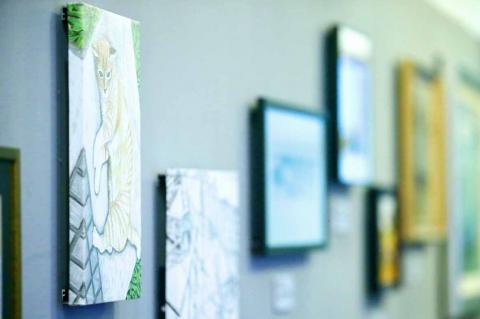The National Archives Administration has proposed an amendment to the Presidential and Vice Presidential Records and Artifacts Act (總統副總統文物管理條例) to clear out thousands of records and gifts taking up space in its warehouse.
Academia Historica, which is tasked with managing presidential and vice presidential records and artifacts, said it has drafted a revision to the act, which was promulgated in January 2004.
The proposed amendment, which is pending legislative review, stipulates that presidential and vice presidential gifts “be classified and then be written off from the inventory for disposal or given away to museums, other government agencies or charity organizations,” Academia Historica said.

Photo: CNA
The act stipulates that gifts worth more than NT$3,000 given to presidents and vice presidents during their tenures have to be turned over to the national archive.
There are more than 12,000 gifts in the archive’s storage, Academia Historica said.
Former president Ma Ying-jeou (馬英九) received about 6,000 gifts during his eight-year tenure from 2008 to last year, and his predecessor, Chen Shui-bian (陳水扁), received about 4,000 gifts, Academia Historica’s collection division chief Hsu Hsiu-jung (許秀容) said.
President Tsai Ing-wen (蔡英文) has received 117 gifts within 42 days of taking office on May 20 last year, Hsu added.
Items gifted to Tsai include a painting of an eagle named after herself and an air purifier for the cat-loving president, Hsu said.
Some of the gifts cannot be stored for long periods of time because they would decay, Hsu said, adding that in such a situation, the cost of preserving them would be higher than the benefit of keeping them.
For example, a leopard fur Ma received from Swaziland is beyond the institute’s professional ability to maintain for a long time, Hsu said.
There should be regulations that allow Academia Historica to determine whether presidential and vice presidential gifts are worthy of long-term storage, Hsu said.
If not, the national archive should have the right to dispose of them, she added.
The gifts are considered national property and cannot be sold, but can be given to museums for exhibition, to groups advocating socially disadvantaged people or to government agencies that might have use of them.
However, if seriously damaged, the items would be destroyed, Hsu said, referring to a clause in the proposed amendment.

Trips for more than 100,000 international and domestic air travelers could be disrupted as China launches a military exercise around Taiwan today, Taiwan’s Civil Aviation Administration (CAA) said yesterday. The exercise could affect nearly 900 flights scheduled to enter the Taipei Flight Information Region (FIR) during the exercise window, it added. A notice issued by the Chinese Civil Aviation Administration showed there would be seven temporary zones around the Taiwan Strait which would be used for live-fire exercises, lasting from 8am to 6pm today. All aircraft are prohibited from entering during exercise, it says. Taipei FIR has 14 international air routes and

Taiwan lacks effective and cost-efficient armaments to intercept rockets, making the planned “T-Dome” interception system necessary, two experts said on Tuesday. The concerns were raised after China’s military fired two waves of rockets during live-fire drills around Taiwan on Tuesday, part of two-day exercises code-named “Justice Mission 2025.” The first wave involved 17 rockets launched at 9am from Pingtan in China’s Fujian Province, according to Lieutenant General Hsieh Jih-sheng (謝日升) of the Office of the Deputy Chief of the General Staff for Intelligence at the Ministry of National Defense. Those rockets landed 70 nautical miles (129.6km) northeast of Keelung without flying over Taiwan,

City buses in Taipei and New Taipei City, as well as the Taipei MRT, would on Saturday begin accepting QR code payments from five electronic payment providers, the Taipei Department of Transportation said yesterday. The new option would allow passengers to use the “transportation QR code” feature from EasyWallet, iPass Money, iCash Pay, Jkopay or PXPay Plus. Passengers should open their preferred electronic payment app, select the “transportation code” — not the regular payment code — unlock it, and scan the code at ticket readers or gates, General Planning Division Director-General Liu Kuo-chu (劉國著) said. People should move through the

The Ministry of National Defense (MND) today released images of the military tracking China’s People's Liberation Army (PLA) movements during the latest round of Chinese drills around Taiwan. The PLA began "Justice Mission 2025" drills today, carrying out live-fire drills, simulated strikes on land and maritime targets, and exercises to blockade the nation's main ports. The exercises are to continue tomorrow, with the PLA announcing sea and air space restrictions for five zones around Taiwan for 10 hours starting from 8:30am. The ministry today released images showing a Chinese J-16 fighter jet tracked by a F-16V Block 20 jet and the